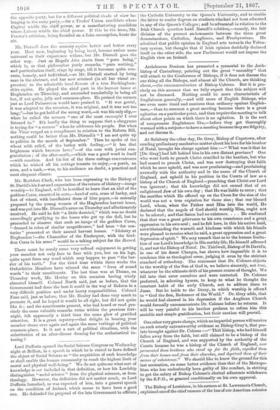Mr. Disraeli does the country squire better and better every
year. Most men, beginning by being local, become rather more universal as their experience widens, but Mr. Disraeli goes the other way. Just as Hegel's Idea starts from " pure being," which is, as that philosopher justly remarks, "pure nothing," and particularizes itself, stage by stage, till it becomes quite con- crete, homely, and individual,—so Mr. Disraeli started by being man in the abstract, and has now attained (in all but visual ex- pression) to the admirable local flavour of a true Buckingham- shire squire. He played the chief part in the harvest home at Hughenden on Thursday, and succeeded wonderfully in being all but, if not quite, jolly and common-place. He praised the sermon just as Lord Palmerston would have praised it. " It was genial, it was adapted to the occasion, it was original, and it was not too long;"—but he got hold of the wrong word,—it was his only slip,— when he called the sermon " one of the most successful I ever listened to." It's hardly the thing to suppose that a clergyman is trying for "a success" when he addresses his people. But when the Vicar verged on a compliment in relation to the Reform Bill, nothing could be better than Mr. Disraeli's " I am not quite up to politics in the month of September." Then he spoke of the wheat with relief, of the barley with feeling,—" it has that brightness which brewers love ;"—of the oats with jovial con- gratulation ; of the after-math,—which was a good word in itself —with emotion. And his list of the three cottage conveniences which he wished all his cottage tenants to enjoy,—a porch, an oven, and a tank,—was, to his audience no doubt, a practical and most eloquent climax.






























 Previous page
Previous page